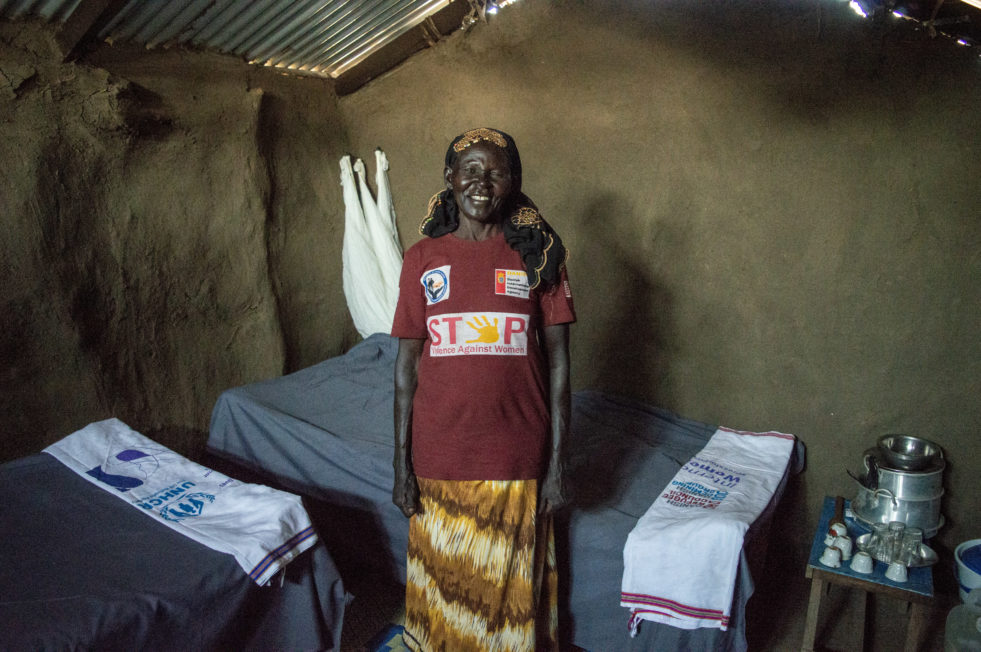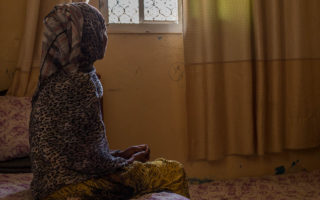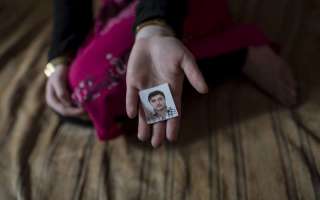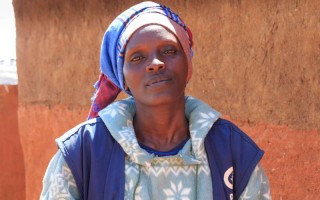
Mama Elizabeth, 65, hosts women refugees in need in her home at a refugee camp in Doro, South Sudan. © UNHCR/Mary-Sanyu Osire
Volunteers living in Maban County’s refugee camps have opened up their homes to care for women affected by sexual and gender-based violence.
Mama Elizabeth, 65, is a Sudanese refugee and one of 48 refugee volunteers, also known as ‘guardian angels,’ who have opened up their homes in four refugee camps in South Sudan’s Maban County to survivors of sexual and gender-based violence (SGBV).
“When I was asked to take on this role, I accepted because I am always happy to help women,” she says with a smile. “I am committed to assist people who are in dire need.”
Two weeks earlier, Mama Elizabeth hosted Sarah*, a mother of nine from Sudan who was fleeing domestic abuse.
Since 2016, these safe havens have hosted women, children and men in need, under an initiative led by UNHCR, the UN Refugee Agency and the Danish Refugee Council. Over 145,000 refugees like Sarah have benefitted under this initiative.
“Women are left behind. Once a girl is married early, she loses the opportunity to pursue education.”
“I chose to go to Mama Elizabeth because I needed peace of mind and shelter,” says Sarah who endured years of ruthless beatings from her husband. When he deserted her and her children, she moved in with her brother who also started beating her. It was too much for her to bear and she decided to run away.
“My brother turned on me when I had just given birth. My child was only three days old,” she recalls.
Mama Elizabeth has been taking in people in need like Sarah for years – a decision that has always come easily to her. These safe havens are also known as community-based shelters, because it is members of the community themselves who are helping newly arrived refugees, not just humanitarian agencies.
UNHCR recognizes the role that the ‘guardian angels’ play as a critical one.
“The ‘guardian angels’ are local leaders who are highly respected by the refugees and host community,” explains Grace Atim, UNHCR’s Protection Officer based in Maban. “They volunteer to take on this role and they have the ability to stand up to perpetrators of SGBV.”
South Sudan’s conflict has forced almost 2.3 million people to flee across six countries in the region, while an additional 2 million South Sudanese have been displaced within the country. About 80 per cent of the displaced are women and children who are prone to various risks, including SGBV.
In 2018, over 1,500 cases of SGBV were reported to UNHCR and partner agencies – cases involving physical, emotional, psychological and sexual violence that have inflicted harm on women, men and children. All reported cases received medical, psychosocial and legal aid, as well as material assistance based on their needs.
To mitigate the risks of SGBV, UHNCR works closely with partner agencies, refugee and host communities to build safe shelters, conduct awareness campaigns, strengthen referral mechanisms and sensitize communities on the importance of combatting the problem.
“We also strive to build the capacity of ‘guardian angels’ like Mama Elizabeth so that they can understand the need to fight SGBV and protect those at risk,” adds UNHCR’s Atim.
“I chose to go to Mama Elizabeth because I needed peace of mind and shelter.”
Mama Elizabeth admits that before attending these trainings, she had a different view on some cultural practices like early marriage, which she respected as part of her community’s tradition.
“After the trainings, I now understand how early marriage is wrong,” she says. “Women are left behind. Once a girl is married early, she loses the opportunity to pursue education.”
Mama Elizabeth adds that education is very important because “someone who is educated can be able to understand a lot of things from around the world and is in a position to deliver.”
As a refugee who has been displaced by conflict multiple times, Mama Elizabeth has lived in Doro camp since 2011. As a women’s representative for five years, she was able to advocate for women’s rights and mobilize community members to create awareness on various issues, including SGBV.
“I was the one that humanitarian organizations spoke to if they wished to share any messages with the women in my community,” she says.
Now she is focused on running the shelter and hopes to continue helping those in need.
* Name changed for security reasons.
Originally published by UNHCR on 7, March 2019





